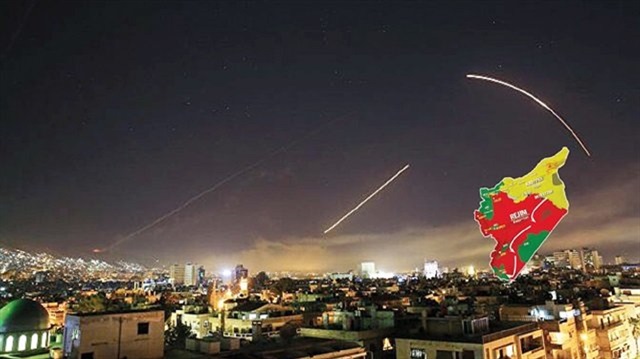
The airstrike in Syria carried out by the U.S., U.K. and France on Saturday can be evaluated as the first step of this new corridor that the Pentagon wants to open to the Mediterranean from the south, says Syrian researcher Nasir Hüso
Syrian experts remarked that the U.S., whose plans to reach the Mediterranean from the north failed with Turkey’s Operation Olive Branch, now plans to open a new southern corridor.
In an interview with Yeni Şafak daily, researcher Nasir Hüso said that the airstrike in Syria carried out by the U.S., U.K. and France on Saturday can be evaluated as the first step of this new corridor that the Pentagon wants to open to the Mediterranean from the south.
Hüso also noted that the terror corridor project, extending from Kirkuk to Latakia-Mediterranean, was rendered inapplicable with the Euphrates Shield and Olive Branch operations and that despite this, Western alliances did not give up on its terror corridor aspirations.
"PKK terrorists cornered in Syria’s Hasakah set Plan B into motion. The new target is to actualize the southern corridor spanning from al-Bukamal to Palmyra,” he said.
Turkey launched Operation Olive Branch on Jan. 20 to clear YPG/PKK and Daesh terrorist groups from Afrin in northwestern Syria amid growing threats from the region.
On March 18, Turkish-backed troops liberated Afrin town center, which had been a major hideout for the YPG/PKK since 2012.
“The Rukban base established in Jordan and the Tanaf base in Syria will be used more actively and frequently from now onwards. The recent developments in Syria is parallel to the alliance between the U.S.-Israel and Gulf countries. The [terror] project has both military and economic aspects. The transfer of oil and natural gas of Syria and Iraq to the Mediterranean through Israel is the most important, ” he said.
“On the other hand, the part of Saudi Arabia’s Neom Project which will encircle Syria and Iraq and will start in the Gulf of Aqaba, expanding Israel’s geographical and economic influence, will turn this “southern terror corridor” project into reality. Everyone in the alliance will get its share if they succeed,” he explained.
“Further steps will be taken to control this new corridor. Iran will be under constant attack, on the route from Deyrizor to Tanaf, directly or indirectly,” he said.
He also stated that the main purpose of this recent air strike was to dimisnish Iran's influence in the region.
In an interview with Yeni Şafak daily, Dr. Ibrahim Salkini, a Syrian academician said that Russia and the United States opted for a series of negotiations before the recent airstrike.
“Russia showed an uncompromising attitude about Tel-Rifat and Idlib, while the U.S. threatens Turkey with Kurdistan Workers’ Party (PKK) terrorists,” he said.
He also stated that the latest attacks plan to isolate Turkey and reiterated the importance of regional cooperation.
Additionally, Hüso said that, geographically, Turkey and Iran are the only option to transport oil and natural gas resources from Syria’s Mosul, Kirkuk, Der ez-Zor, Hassakah and Homs.
“Iran already markets a significant portion of petrol from Mosul and Kirkuk through Tehran. If this new corridor is opened from the Badia desert to Jordan, Turkey will sidelined. The U.S., Europe, Israel and the Gulf states are united on this,” he said.






